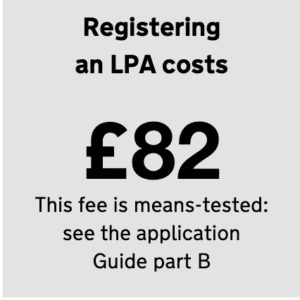Granting Lasting Power of Attorney can be surprisingly easy. There are different types of Power of Attorney but the Lasting Power of Attorney is the most commonly used.
Referred to as an LPA, it is a legal document which allows you, known as the Donor, to appoint one or more people to help you manage your financial and property affairs or make decisions about your health and welfare. They can help you when you have capacity or make decisions when you are no longer capable, when you have lost your mental capacity.
This document gives you more control over what happens if you have an accident or an illness that means someone else will need to make decisions for you. This could be either temporary or permanent.
Of key importance is that you must make sure you have appointed an attorney before you lose the capacity to do so. Otherwise, people will be making decisions on your behalf who you haven’t chosen.
Two types of Lasting Power of Attorney
There are two types of LPA and you will need to decide whether you need one or both. It is probably wise to have both and you don’t have to use the same attorney for each one, though you can. The two LPAs are:
- Financial Decisions – LP1F – see Downloads below
- Health and Care Decisions – LP1H – see Downloads below
Choosing your Power of Attorney
It is extremely important to take the time to choose the right attorney – see General Guide for the donor.
Five Steps to setting up an LPA
In short, there are five key steps if you’re creating an LPA in England or Wales:

- Download the paperwork (see Downloads below) or complete the form online and do it while you still have capacity. This is important – don’t wait.
- Fill it in. You can do it yourself or you can get help from someone you know well, or a solicitor, or Citizens Advice.
- Get it signed by a certificate provider (eg a solicitor or doctor, or someone you have known well for at least two years) who can vouch that you know what you’re doing and that nobody is coercing you.
- If there are ‘People to notify’ or ‘People to be told’ listed in your LPA application, you’ll have to send them an LP3 form (see Downloads below), which gives them three weeks to raise objections. If you’re applying online, the service will create and fill in the LP3 for you.
- Register it with the Office of the Public Guardian while you still have capacity (if you’ve lost capacity but signed the document before, your Attorney can register it; and if you don’t register it, it’s not valid).
The OPG currently has a delayed service of about 20 weeks to register an LPA so make sure you send the form in in good time.
If you are not sure whether you want to fill the forms out yourself or get help from a professional, read this: Do you need a solicitor to register a power of attorney?
The Fee
You will need to pay the following (in England & Wales):
- £82 for a Lasting Power of Attorney
- £41 for a repeat
Remission
If you, the Donor’s, gross annual income is less than £12,000, you may be eligible for a 50 per cent reduction in the fee.
Exemption
If you, the Donor, receives any means-tested benefits when an application to register is made, you can apply for an exemption.
For more information on fees click here for the LPA120
Download Forms
LPA for Financial Decisions make and register (complete pack) – zip file
LPA for Financial Decisions make and register (large print) – zip file
LPA for Health and Care Decisions: make and register (complete pack) – zip file
LPA for Health and Care Decisions: make and register (large print) – zip file
LP1F – LPA for Financial Decisions
LP1H – LPA for Health and Care Decisions
LP12 – Make and register your Lasting Power of Attorney – a guide (web version)
LPA Form continuation Sheets (LPC)
LP3 – form for notifying people
REGISTER
Whether you have filled the documents out online or printed your documents off and filled them in, you will need to send them to the Office of the Public Guardian:
Send to:
Office of the Public Guardian
PO Box 16185
Birmingham
B2 2WH
